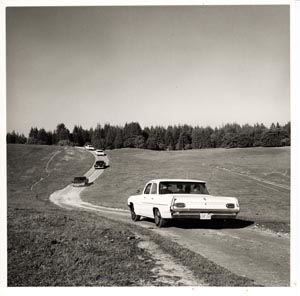Campus News
The road to ’65
UCSC is turning 50 in 2015! We’re starting the celebration by presenting stories in each issue of Review of what was happening on campus 50 years ago.

Editor’s note: UCSC is turning 50 in 2015! How time flies. We’re starting the celebration by presenting stories in each issue of Review of what was happening on campus 50 years ago. First up: In 1962, the founding University Librarian arrives on campus and begins creating McHenry Library.
Fifty years ago, in the fall of 1962, the Cuban Missile Crisis was escalating, and the United States and the Soviet Union came as close as they ever would to global nuclear war.
Against that backdrop of worldwide disaster, a University of California campus was being born in Santa Cruz, getting ready for its opening three years later.
Preparations for the new campus were beginning to roll. In September 1962, the campus’s first librarian arrived, ready to start a university library from scratch.
His name was Donald Clark (1911–1993), and he was the first of Chancellor Dean E. McHenry’s academic appointments at UCSC.
Before his appointment at Santa Cruz, Clark had been at Baker Library at the Harvard Graduate School of Business for more than 20 years.
Chancellor McHenry’s invitation to participate in the Santa Cruz experiment in public higher education was a rare opportunity that Clark felt he couldn’t pass up. He was also excited by the prospect of building a new library.
“Can you imagine the opportunity that would be given a librarian to start from zero?” Clark asked his interviewer in his oral history, Donald T. Clark: Early UCSC history and the founding of the University Library.
“Clark was a book man first and foremost, but he looked beyond the titles,” said Hal Hyde, UCSC’s first vice chancellor of business and finance. “He was broadly interested in the community and in geography.”
In late October 1962, President John F. Kennedy negotiated with Soviet Premier Nikita Khrushchev to settle the Cuban Missile Crisis. The world breathed easier, and work on the UCSC campus could continue without the threat of nuclear disaster.
Clark proceeded with making plans for the building of McHenry Library. He became a pioneer in the area of library automation, working to create a computerized book catalog at UC Santa Cruz in the 1960s—the first such effort in the UC system.
Today’s library—recently renovated—includes a café, collaborative study areas, a large information commons containing more than 60 computer stations, a “laptop bar” with stools for optimum studying, and full wireless coverage.
Though McHenry Library has embraced the digital information age, it remains, as it began, a place for study, contemplation, and discovery— just as its founders envisioned it.